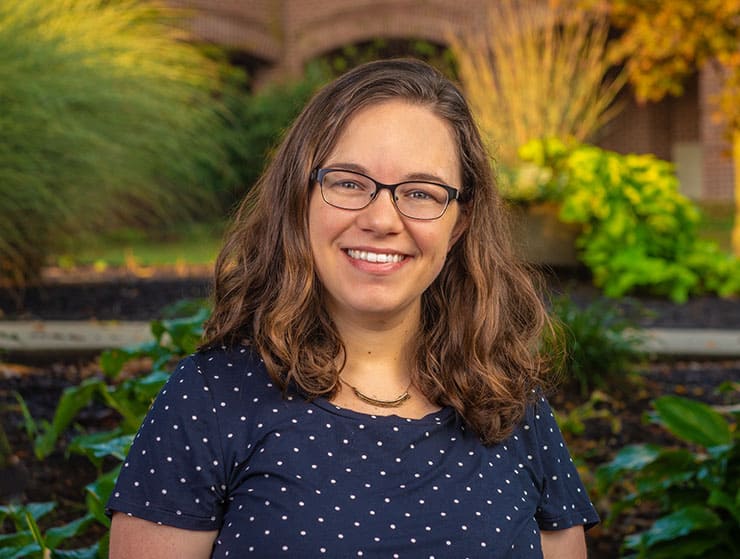“As a biology professor, I have the privilege of helping students observe and understand the natural world that they inhabit. I work with my students to show them how using the scientific method can allow them to answer questions that have applications in all sorts of real world scenarios, from medicine to ecology to agriculture and beyond.”
Title
Assistant Professor of Biology
Educational Background
- Postdoctoral Fellow, University of Chicago – Chicago, IL
- Ph.D., University of Pittsburgh – Pittsburgh, PA
- B.S., Purdue University – Lafayette, IN
Year Joined Franklin
2020
Expertise
I am a microbiologist who has studied all sorts of microscopic life forms, including bacteria, fungi, and viruses. Specifically, I’m fascinated by the relationship between humans and the microbes that live in and on them, from friendly bacteria that inhabit our guts to pathogenic viruses that make us sick. In my doctoral and postdoctoral research, I focused on studying the ways that human cells respond to these various microbes.
Why should I care about biology?
You ARE biology! When you become a biologist, you learn how to answer questions about what makes life happen, including your own life. Understanding how living things tick isn’t just fascinating, it’s also necessary for crucial parts of our society. From helping people stay healthy, to preserving our natural environment, to raising and growing the food that the world needs, so many roles in our modern world require a background in biology!
Is biology just about memorizing facts?
Definitely not – biology is about discovery! At Franklin College you’ll get hands-on experience in using the scientific method to answer questions about living things. Have you ever swam in a lake and wondered what kind of microbes were swimming there with you? Or eaten a really great apple and wondered what made it so different from a mealy Red Delicious? If you’ve ever had a question about the natural world, becoming a biologist will give you the tools to answer those questions!
Selected Professional Accomplishments
Recent Grants
- Individual Postdoctoral Fellowship (F32) National Research Service Award – National Institutes of Health, National Institute of Diabetes and Digestive and Kidney Disease
- Pilot and Feasibility Award; $30,000 award to be used to support research costs – University of Chicago Digestive Disease Research Core Center
Publications
- Microbiota composition modulates inflammation and neointimal hyperplasia after arterial angioplasty. Cason CA, Kuntz TM, Wun K, Gottel NR, Harris KG, Xiong L, Nooromid MJ, Chen EB, Morton TC, Doane BM, Avram MJ, Chang EB, Gilbert JA, Ho KJ. Accepted at Journal of Vascular Surgery.
- Arterial inflammation and neointimal hyperplasia development in a germ-free mouse model of carotid ligation. Wun K, Theriault BR, Pierre JF, Leone VA, Harris KG, Chen EB, Xiong L, Jiang Q, Eskandari OM, Chang EB, Ho KJ. Plos One, 2018 Dec 6;13(12):e0208426.
- The Intestinal Microbiota in the Pathogenesis of Inflammatory Bowel Diseases: New Insights into Complex Disease. Harris KG, Chang EB. Clinical Science, 2018 Sep 18; 132(18):2013-2028.
- Unc93b induces apoptotic cell death and is cleaved by host and enteroviral proteases. Harris KG, Coyne CB. PLoS ONE, 2015 Oct 28; 10(10):e0140383. doi:10.1371/journal.pone.0141383.
- RIP3 regulates autophagy and is required for Coxsackievirus B3 infection of polarized intestinal epithelial cells. Harris KG, Morosky SA, Drummond CG, Patel M, Kim C, Stolz DB, Bergelson JM, Cherry S, Coyne CB. Cell: Host & Microbe, 2015 Aug 12; 18(2):221-232.
- Death waits for no man—Does it wait for a virus? How enteroviruses induce and control cell death. Harris KG, Coyne CB. Cytokine Growth Factor Rev, 2014 Oct; 25(5):587-96.
- Enter at your own risk: How enteroviruses navigate the dangerous world of pattern recognition receptor signaling. Harris KG, Coyne CB. Cytokine, 2013 Sep; 63(3):230-6.
- Focal adhesion kinase is a component of RIG-I-like receptor antiviral signaling. Bozym RA, Delorme-Axford E, Harris K, Morosky S, Ikizler M, Dermody TS, Sarkar SN, Coyne CB. Cell: Host & Microbe, 2012 Feb 16; 11(2):153-66.
- Interaction of decay-accelerating factor with echovirus 7. Plevka P, Hafenstein S, Harris KG, Cifuente JO, Zhang Y, Bowman VD, Chipman PR, Bator CM, Lin F, Medof ME, Rossmann MG. Journal of Virology, 2010 Dec; 84(24):12665-74.
In My Spare Time…
This year, my goal is to learn how to make sourdough bread from a homemade sourdough starter! It’s always fun when I can combine microbiology with delicious food.
